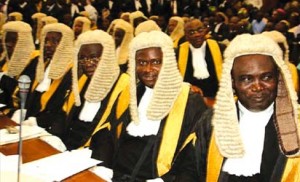Three judges face compulsory retirement if the recommendations of the National Judicial Council is approved by the president.
Nigeria’s regulatory body for the judiciary, has recommended the compulsory retirement of three judges following allegations of fraud and other judicial misconduct.
The NJC decided on the disciplinary measure following the outcome of investigations into petitions against the judges bordering on fraud and judicial misconduct.
The judges are the Chief Judge of Enugu State, A. I. Umezulike; a presiding justice at the Court of Appeal in Kwara State, Mohammed Tsamiya; and Kabiru Auta of the Kano State High Court.
According to a statement by the Council’s Director of Information, Soji Oye, they were sacked by the NJC during the council’s 78th meeting held on September 29.
The statement was made available to journalists on Friday.
Oye’s statement explains that Justice Umezulike was accused of abusing his office and mistreating defendants.
“That the Hon. Chief Judge failed to deliver Judgement in Suit in which final addresses were adopted on 23rd October, 2014, until the 9th day of March, 2015, about 126 days after addresses were adopted.”
The act goes contrary to constitutional provisions that judgement should be delivered within a period of 90 days after adoption of addresses.
The council also said Umezulike abused his privileges when he ordered the petitioner, Eze, to be arrested by police officers and brought to court, after an agreement had been reached on a matter before him and judgement entered on terms of settlement.
Umezulike was also accused of making defamatory statements in public against the petitioner, contrary to Rule 1.3 of the National Judicial Council Revised Code of Conduct for Judicial Officers.
“That there have been many instances of abuse of Judicial powers, by the Chief Judge, particularly against the two defendants in Suits Nos. E/6/2013 and E/88/2016.
“The Chief Judge clung to these two suits to remain in his Court, despite all genuine efforts made by the defendants to get the suits transferred to another Court.
“That the Chief Judge sitting at a vantage position of Senior Judicial Officer and Head of Court for that matter, should not have all














